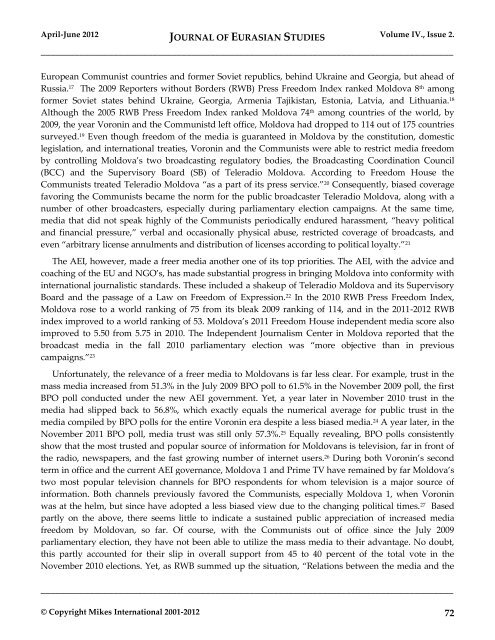You also want an ePaper? Increase the reach of your titles
YUMPU automatically turns print PDFs into web optimized ePapers that Google loves.
April-June 2012 JOURNAL OF EURASIAN STUDIES Volume IV., Issue 2.<br />
_____________________________________________________________________________________<br />
European Communist countries and former Soviet republics, behind Ukraine and Georgia, but ahead <strong>of</strong><br />
Russia. 17 The 2009 Reporters without Borders (RWB) Press Freedom Index ranked Moldova 8 th among<br />
former Soviet states behind Ukraine, Georgia, Armenia Tajikistan, Estonia, Latvia, and Lithuania. 18<br />
Although the 2005 RWB Press Freedom Index ranked Moldova 74 th among countries <strong>of</strong> the world, by<br />
2009, the year Voronin and the Communistd left <strong>of</strong>fice, Moldova had dropped to 114 out <strong>of</strong> 175 countries<br />
surveyed. 19 Even though freedom <strong>of</strong> the media is guaranteed in Moldova by the constitution, domestic<br />
legislation, and international treaties, Voronin and the Communists were able to restrict media freedom<br />
by controlling Moldova’s two broadcasting regulatory bodies, the Broadcasting Coordination Council<br />
(BCC) and the Supervisory Board (SB) <strong>of</strong> Teleradio Moldova. According to Freedom House the<br />
Communists treated Teleradio Moldova “as a part <strong>of</strong> its press service.” 20 Consequently, biased coverage<br />
favoring the Communists became the norm for the public broadcaster Teleradio Moldova, along with a<br />
number <strong>of</strong> other broadcasters, especially during parliamentary election campaigns. At the same time,<br />
media that did not speak highly <strong>of</strong> the Communists periodically endured harassment, “heavy political<br />
and financial pressure,” verbal and occasionally physical abuse, restricted coverage <strong>of</strong> broadcasts, and<br />
even “arbitrary license annulments and distribution <strong>of</strong> licenses according to political loyalty.” 21<br />
The AEI, however, made a freer media another one <strong>of</strong> its top priorities. The AEI, with the advice and<br />
coaching <strong>of</strong> the EU and NGO’s, has made substantial progress in bringing Moldova into conformity with<br />
international journalistic standards. These included a shakeup <strong>of</strong> Teleradio Moldova and its Supervisory<br />
Board and the passage <strong>of</strong> a Law on Freedom <strong>of</strong> Expression. 22 In the 2010 RWB Press Freedom Index,<br />
Moldova rose to a world ranking <strong>of</strong> 75 from its bleak 2009 ranking <strong>of</strong> 114, and in the 2011-2012 RWB<br />
index improved to a world ranking <strong>of</strong> 53. Moldova’s 2011 Freedom House independent media score also<br />
improved to 5.50 from 5.75 in 2010. The Independent <strong>Journal</strong>ism Center in Moldova reported that the<br />
broadcast media in the fall 2010 parliamentary election was “more objective than in previous<br />
campaigns.” 23<br />
Unfortunately, the relevance <strong>of</strong> a freer media to Moldovans is far less clear. For example, trust in the<br />
mass media increased from 51.3% in the July 2009 BPO poll to 61.5% in the November 2009 poll, the first<br />
BPO poll conducted under the new AEI government. Yet, a year later in November 2010 trust in the<br />
media had slipped back to 56.8%, which exactly equals the numerical average for public trust in the<br />
media compiled by BPO polls for the entire Voronin era despite a less biased media. 24 A year later, in the<br />
November 2011 BPO poll, media trust was still only 57.3%. 25 Equally revealing, BPO polls consistently<br />
show that the most trusted and popular source <strong>of</strong> information for Moldovans is television, far in front <strong>of</strong><br />
the radio, newspapers, and the fast growing number <strong>of</strong> internet users. 26 During both Voronin’s second<br />
term in <strong>of</strong>fice and the current AEI governance, Moldova 1 and Prime TV have remained by far Moldova’s<br />
two most popular television channels for BPO respondents for whom television is a major source <strong>of</strong><br />
information. Both channels previously favored the Communists, especially Moldova 1, when Voronin<br />
was at the helm, but since have adopted a less biased view due to the changing political times. 27 Based<br />
partly on the above, there seems little to indicate a sustained public appreciation <strong>of</strong> increased media<br />
freedom by Moldovan, so far. Of course, with the Communists out <strong>of</strong> <strong>of</strong>fice since the July 2009<br />
parliamentary election, they have not been able to utilize the mass media to their advantage. No doubt,<br />
this partly accounted for their slip in overall support from 45 to 40 percent <strong>of</strong> the total vote in the<br />
November 2010 elections. Yet, as RWB summed up the situation, “Relations between the media and the<br />
_____________________________________________________________________________________<br />
© Copyright Mikes International 2001-2012 72
















